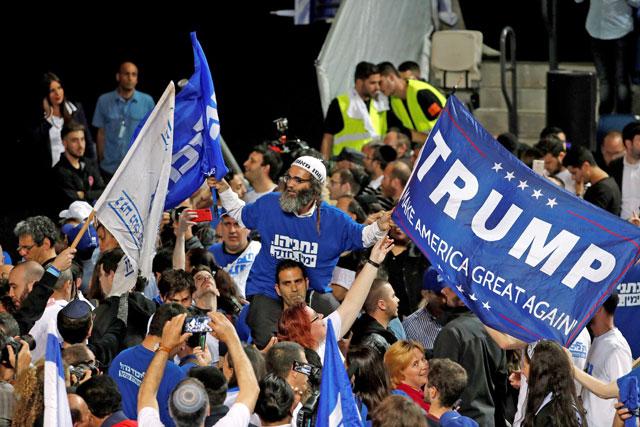You are here
Trump Mideast plan, bribery charges to dominate Netanyahu’s record term
By Reuters - Apr 11,2019 - Last updated at Apr 11,2019

A supporter of Israeli Prime Minister Benjamin Netanyahu’s Likud Party waves flags, one bearing the name of US President Donald Trump, as the crowd reacts to exit polls in Israel’s parliamentary election at the party headquarters in Tel Aviv, Israel, on Wednesday (Reuters photo)
MAALE ADUMIM, West Bank — Israeli Prime Minister Benjamin Netanyahu’s record fifth term is likely to be dominated by corruption allegations, scrutiny of his election promises and the unveiling of US President Donald Trump’s long-awaited Middle East plan.
In the closing days of a campaign that had been driven more by personalities than policy, Netanyahu, 69, seized international attention by promising to annex Jewish housing units in the occupied West Bank.
“Who says that we won’t do it? We are on the way and we are discussing it,” Netanyahu told Israel’s Channel 12 News on April 7 when he was asked why he had not extended Israeli sovereignty to large West Bank housing units.
Some political analysts saw the right-wing leader’s pledge as a calculated bid before Tuesday’s election to siphon votes from far-right rivals who have long advocated annexation of the West Bank, where more than 400,000 Israeli settlers now live, among 2.9 million Palestinians.
Settlements, which Israel’s B’Tselem rights group says cover about 10 per cent of the West Bank, are one of the most heated issues in efforts to restart peace talks, frozen since 2014.
The Palestinians and many countries consider the housing units illegal under the Geneva conventions that bar settling on land captured in war. Israel disputes this, citing security needs and biblical, historical and political connections to the land.
Netanyahu’s words drew immediate condemnation from Palestinians, and created an expectation among some settlers, at least, that he would deliver if reelected.
“May the dream of annexation come true,” said Itzik Gideon, a 65-year-old resident of the settlement of Maale Adumim near Jerusalem. “I think we will get more building permits here in Maale Adumim, it will do us much good.”
Others expressed concern that without annexation, their settlements could be evacuated, as a previous Israeli government did with its settlements in Gaza in 2005, a move that Netanyahu opposed.
“My friends have been driven out from their house, so I hope it’s not going to happen again. Not to me, not to anyone in the settlements,” said Sipir Cohen, 25, a kindergarten teacher from Shilo settlement.
After Netanyahu’s reelection, Palestinians voiced fears that the Israeli leader would now feel emboldened.
“Regrettably, Israelis overwhelmingly voted for candidates that are unequivocally committed to entrenching the status quo of oppression, occupation, annexation and dispossession in Palestine,” said Hanan Ashrawi, a member of the Palestine Liberation Organisation’s executive committee. “Israelis chose to entrench and expand apartheid.”
Hazen Taha, a Palestinian security guard in the West Bank city of Ramallah, said: “the current American administration will give Israel the freedom to do whatever it likes.”
Trump plan
Whatever Netanyahu’s intentions, the annexation promise is likely to go on the backburner at least until Trump releases his administration’s long-awaited Mideast plan.
“There is certainly no point in making any unilateral step before we hear what the American president’s plan is,” Tzachi Hanegbi, a government minister and senior Likud legislator, told Israel Radio on Thursday.
The US proposal, which is shrouded in secrecy, is being spearheaded by his son-in-law, Jared Kushner, and is expected to be released only after Netanyahu forms a new governing coalition.
Trump has given Netanyahu several political boosts over the past year and a half, including his decisions to recognise Jerusalem as Israel’s capital and to move the US embassy to the city.
However, US officials say the plan will demand compromises from both sides, despite scepticism from Palestinians who have refused to deal with a White House that they regard as too biased towards Israel.
If it does require Israeli territorial concessions, it is certain to infuriate Netanyahu’s right-wing allies and rivals.
Some of those conservatives reacted with fury in February to reports that the Trump plan might address long-standing — and politically incendiary — issues such as borders between Israel and the Palestinians. They feared this would be a harbinger to a Palestinian state, which they oppose.
“In the next few months the focus will be the US peace plan, and Netanyahu’s reelection fits with American desire to go ahead with it,” said Ofer Zalzberg, senior analyst at the International Crisis Group.
“Netanyahu will then have to deal with differences within his coalition,” he added.
Netanyahu opposed the Oslo interim peace accords between Israel and the Palestinians in the 1990s. In 2009 he conditionally accepted the creation of a Palestinian state but in 2015 he vowed that no state would be created under his watch.
Indicment deadlock
Aside from policy concerns, Netanyahu’s political future may also depend on the outcome of three corruption cases that Attorney General Avichai Mandelblit plans to indict him on.
Netanyahu faces allegations of wrongfully accepting $264,000-worth of gifts from business leaders and dispensing favours to try to secure positive coverage in a newspaper and on a website. He denies any wrongdoing, but could face up to 10 years in prison if convicted of bribery.
If charged — Netanyahu will be able to plead his case to Mandelblit in a pre-trial hearing — he will not be required by law to step down. His position could be secured if Parliament legislated against indicting a sitting prime minister.
Several of Netanyahu’s right-wing allies have said they would support such a law, although many have rejected applying it retroactively.
Netanyahu gave a cryptic reply when he was asked about the idea in an interview with Israel Radio last week.
“I’m not dealing with it, and that’s the truth, just like I haven’t dealt with other things,” he said.
Still, coalition partners could try to wriggle concessions from Netanyahu, such as expanding housing units or allocating funds, in exchange for their support of immunity legislation or a promise to remain in a government led by a prime minister dividing his time between governing and court.
“If the indictment against Netanyahu is confirmed there is likely to be significant policy deadlock,” said Jack Kennedy, a senior analyst at data compiler IHS Markit.
“Netanyahu would likely be under far greater obligation to secure the support of the smaller members of his coalition.”
Hanegbi, the Likud Cabinet minister, said he was unaware “as things stand now, of any initiative in the coalition” regarding an immunity law.
“For now, we know that [Netanyahu] believes in his innocence and will go to the [attorney general’s] hearing with the entire defence team,” Hanegbi said.
No date has been set the procedure.
Related Articles
OCCUPIED JERUSALEM — Israeli Defence Minister Avigdor Lieberman said on Monday that the United States has warned that annexing the occupied
OCCUPIED JERUSALEM — A bill that critics say would amount to de facto annexation of Israeli settlements surrounding Jerusalem is expected to
OCCUPIED JERUSALEM — Israeli far-right politicians on Tuesday welcomed initial approval of a bill to legalise some 4,000 settler housing uni
















